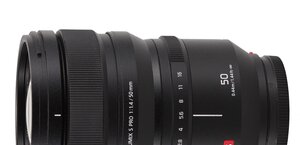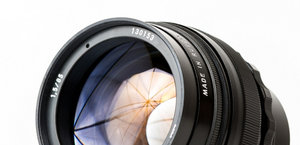Sony FE 50 mm f/1.4 GM
4. Image resolution
Let's check how the Sony FE 50 mm f/1.4 GM compares – its results in the frame centre and on the edges of the APS-C sensor and full frame are presented below.

Taking into account the fact that the tested model, with one group of elements more, is more optically complex than its faster brother, the FE 50 mm f/1.2 GM, I expected here a brilliant performance. And still I was very pleasantly surprised.
Please Support UsIf you enjoy our reviews and articles, and you want us to continue our work please, support our website by donating through PayPal. The funds are going to be used for paying our editorial team, renting servers, and equipping our testing studio; only that way we will be able to continue providing you interesting content for free. |
- - - - - - - - - - - - - - - - - - - - - - - - - - - - - - - - - - - - - - - - - - - - - - - -
At the maximum relative aperture you get a truly outstanding result, reaching over 75 lpmm, distinctly higher than the maximum performance of the Sonnar 55 mm f/1.8 T* ZA and the FE 50 mm f/1.8 after stopping them down.
By f/2.0 the tested lens's resolution amounts to 88.6 lpmm which would be our new record but it isn't – on further stopping down this value becomes even better so the new, completely sensational record we see by f/2.8 and it currently ammounts to 90.9 +\- 1.1 lpmm. I admit it's shocking how the 1.4/50 model outperformed its faster 1.2/50 brother which maximum MTF values barely reached close to 80 lpmm.
The performance on the edge of the APS-C sensor should be described in similar terms. Near the maximum relative aperture you get excellent results of about 69 lpmm and on stopping down you can reach 78-79 lpmm so higher values than the maximum results reached in the frame centre by system f/1.8 standards or the Samyang AF 50 mm f/1.4 FE.
The edge of full frame also is beyond reproach. By f/1.4 and f/2.0 resolution is near 58-59 lpmm; what's interesting, the result by f/2.0 is a tad lower than that by f/1.4. The difference is so small that it falls within the margin of error. Additionally, the lack of any distinct improvement between these two apertures can be connected to the fact that chromatic aberration between them increases very quickly but we are going to deal with this in the next chapter.
Of course it doesn't change the fact that even by f/1.4 images are of very good quality and from f/2.8 you see only splendid results. The peak of the performance, amounting to 66 lpmm, we noted by f/5.6. As a reference point we would like to remind here that the maximum result of the Sonnar 55 mm f/1.8 T* in the frame centre was over 3 lpmm lower.
There could be just one summary of this chapter – a very positive one. Undoubtedly we deal here with an outstanding lens, one of the sharpest we have ever tested. A round of applause for Sony!
At the end of this chapter, traditionally, we present crops taken from photos of our resolution testing chart which were saved as JPEG files along the RAW files, used for the analysis above.
| A7R III, JPEG, 50 mm, f/1.4 |
 |
| A7R III, JPEG, 50 mm, f/2.8 |
 |






